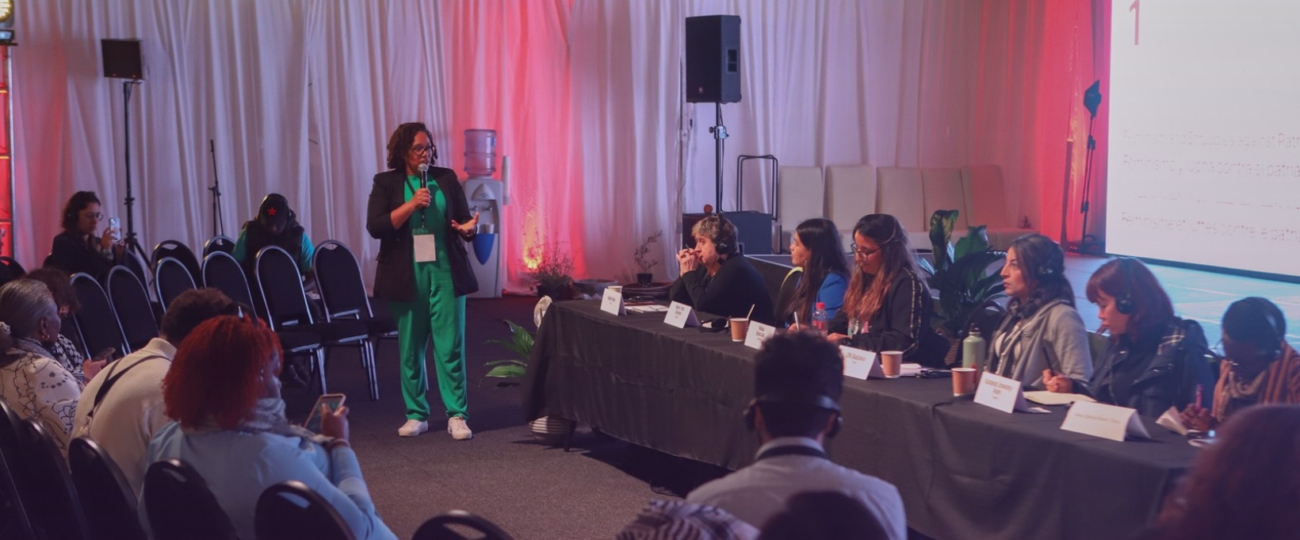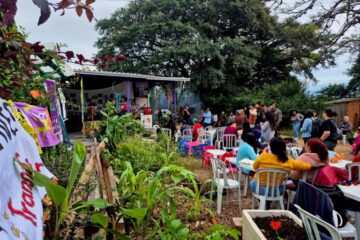The 3rd International Conference Dilemmas of Humanity was held in Johannesburg, South Africa in October 2023. It is a demonstration that organizing around the internationalist socialist struggle is a strong movement, Members of political organizations, social movements, parties, and trade unions from all over the world came together to debate and build an agenda of common struggles to build socialism, organize the working class, defend life and nature, build popular democracy, and wage the anti-imperialist struggle for sovereignty of peoples and territories.
In a video produced by Capire during the conference, women from different parts of the world talk about what is needed to build a feminist socialism. Watch:
The socialist and internationalist struggle is built by many hands and can only advance if women are present and active. In order to articulate this struggle as a central and transversal axis in building the society we want , the seminar “Feminisms and the struggle against patriarchy”, held on October 16, was part of the conference program. It was a moment for debate and reflection on how crucial women’s organizations and gender dissident people’s organizations are in shaping a socialist, internationalist, and solidarity project. The international conference was the result of the accumulation of regional conference editions, where feminist struggles and the fight against patriarchy appeared as a central theme of the class struggle in continents.
The following participants joined the seminar: professor, researcher and activist Akua Opokua Britwum, from Ghana; Thai democracy activist Kunlanat Jirawong-Aram; Tunisian Workers’ Party member Olfa Baazaoui; María Inés Davalos, an activist from the National Coordination of Organizations of Working, Rural, and Indigenous Women (Coordinadora Nacional de Organización de Mujeres Trabajadoras, Rurales e Indígenas – Conamuri) from Paraguay; Maite Mola from the Basque Country and a member of the European Left Party; and Maisa Bascuas, a researcher from the Tricontinental Institute for Social Research in Argentina, in charge of the mediation. The debate began with a screening of Indian documentary Kerala’s Kudumbashree: When Millions of Women Organize, produced by Peoples Dispatch and NewsClick. The documentary tells the story of more than four million women organized in the struggle for autonomy in India’s southern state of Kerala.
Building a feminist socialism
According to Akua Opokua, patriarchy precedes capitalism. But since capitalism has taken shape, the patriarchal structure has been redesigned to allow even greater exploitation of women’s labor. In Ghana, she explains, women have played an important role in the struggle against colonialism and towards the country’s independence. After independence, the struggle was organized on the basis of anti-imperialism, in line with struggles across the African continent against apartheid and the exploitation of labor and nature by European countries. Organized women’s groups have expanded over the years, confronting and denouncing the appropriation of feminism by the neoliberal agenda. “In the socialist movement in Ghana, we’re seeking for young people who want a different society to bring about change because there is a connection between patriarchy and the capitalist system”, she states.
In Thailand, left-wing newspaper Dindeng covers the struggle for democracy in the country and the socialist feminism shaped by Thai women. The newspaper is focused on producing texts, podcasts, and translations in Thai on global left debates. They aim at making information accessible to the population. Kunlanat Jirawong-Aram explains that women in Thailand face one of the highest incarceration rates in the world. “One of our comrades who was in jail has told us that almost all the women she met in prison were there because of the men in their life”, she explains. In addition, they are victims of US militarism and imperialism, which continues to operate in the country. Despite the challenges they face, in Dindeng, women organize themselves to share their feminist agenda in articles published on the website and also in street mobilizations.
In Tunisia, women have played a central role in the national liberation movement. Olfa Baazaoui explains that even though the most progressive laws recently enacted have been attributed to the president, such laws are the outcome of women’s movement work. In 2021, there was a coup d’état in Tunisia, when President Kaïs Saïed dissolved the parliament. To this day, he governs as the sole ruler with full powers. “We’re fighting to try to preserve the democratic gains we’ve had because that’s the only way we can help women organize and fight for democracy and more rights,” Olfa explains.
In Paraguay, Conamuri comrades, who are CLOC-Via Campesina members, have been shaping peasant and popular feminism as a political commitment to defending life. They are grounded on experiences in the territories. Feminism involves defending the land, seeds, and confronting violence. “The struggles are alive and we know that the fight for women’s emancipation has to go hand in hand with the end of private property,” says María Inés Davalos. In Latin America, the vast occupation of land by transnational companies and agribusiness is one of the main challenges. However, in the same territory, there are women who live off their land and their produce, and who are fighting for food sovereignty: “it’s our way of communicating with others, fighting transnational corporations and protecting ourselves from GM seeds”.
In Europe, women have been fighting against the rise of the far-right and conservatism and the increase in violence, especially against migrant women from the Global South. For Maite Mola, although the problem of immigration is not specific to women, they are the ones who suffer the most at the borders and from vulnerabilities they encounter when arriving in the countries they have moved to. In this part of the world, there is also progress concerning women’s complaints against pornography and ever-updating forms of cyber-violence, such as the creation of pornographic deep fakes , using images of any woman who has ever published photos online. “Furthermore, the issue of abortion is a central one. We need to fight for this right. This is also class struggle, not a matter of whims. Even though it’s illegal, women who have money can have abortions, and those who don’t, die,” Maite said.
For Kunlanat, feminist construction also involves breaking down the division between rationality, seen as masculine and appreciated, and sensitivity, seen as feminine and useless in the struggle: “the political spaces are normalized to be male dominated, and women are not seen as political. Even now women is seen as people with no thoughts of their own and ideas in a world that tries to put logic over emotions. But emotions shouldn’t be inferior. We should embrace emotions as political”. On feminism and the socialist struggle, María Inés shares that “for us, feminism is class-based because it seeks to build socialism. We used to say ‘no feminism, no socialism’ but we have to move forward with a positive vision. Today, we say ‘with feminism, we build socialism‘”.




